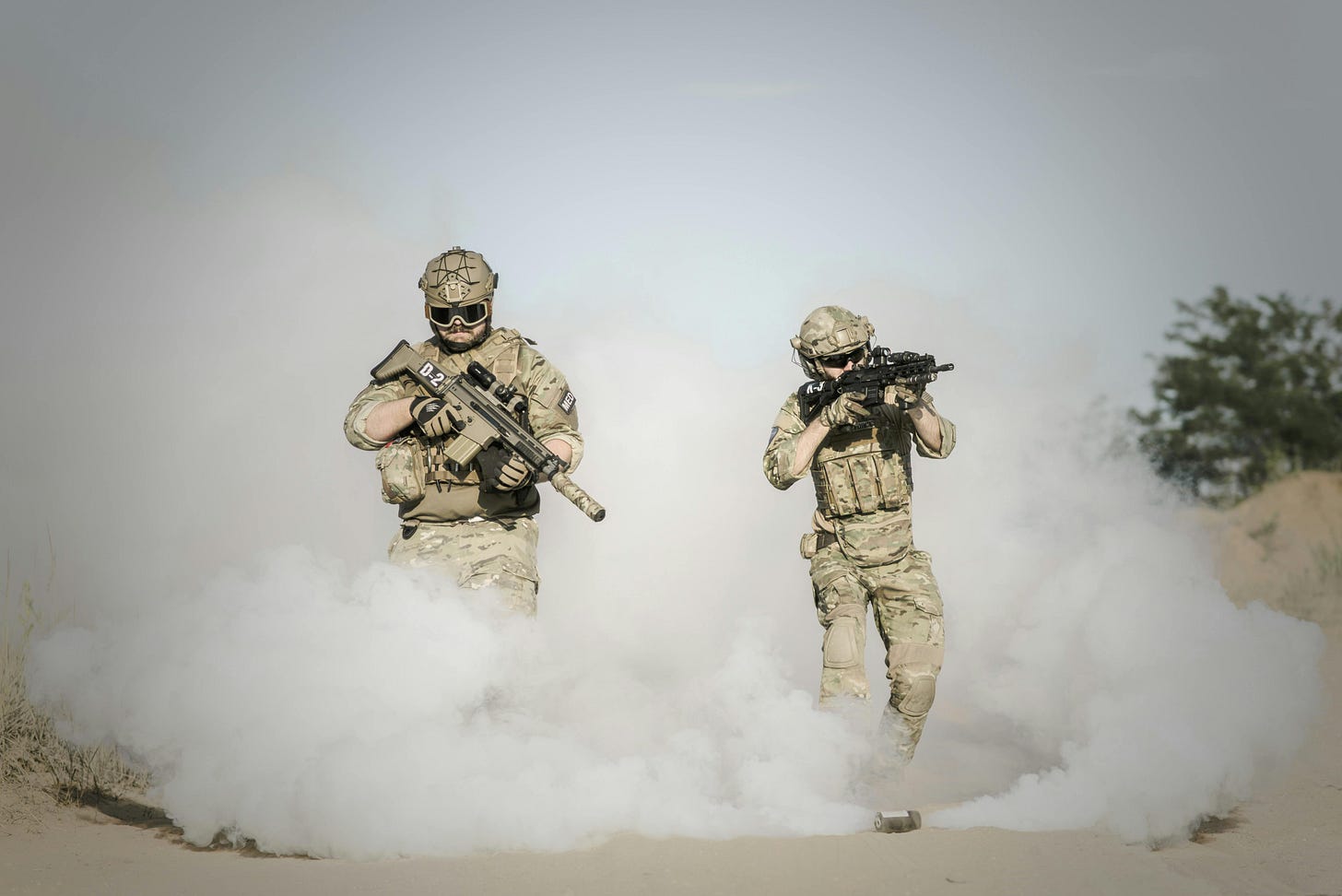Collateral Good
Sometimes a hulking evil force - such as the United States - will do collateral good
Since Russia invaded Ukraine, some tensions within the US left have burst uncomfortably into the open. Many internationalists are understandably opposed to finding themselves aligned with the interests of the US state department and the McMansions of Northern Virginia. But it’s possible for a wholly evil agent–such as the US–to incidentally do good on the world stage in the course of its cynical machinations. These are incidents of collateral good and grasping them clearly is key to understanding not only Ukraine, but also how US imperialism unfolds in a complex world.
Unlike collateral damage, an accidental harm, collateral good1 is an unintended good, usually aiding a just cause. Because it’s understandable to simply detest every act of an imperialist power, especially whichever one leads the imperialist pack, the idea of collateral good is helpful when trying to make sense of the complex and sickening game of imperialist politics.
The US, today, is the richest, most powerful imperialist country in the history of the world, having taken the Alpha spot from the UK as colonialism fell from fashion and neo-colonialism rose. The list of crimes of the US ruling class has committed in just the last 70 years is astounding: dozens of direct invasions, coups and assassinations, sometimes forcing states to fail; starvation sanctions and forced structural adjustments; aid and comfort for other countries’ domestic fascists of every sort; obstructing international law to enable war crimes and genocide; swamping other countries’ domestic politics with outside money–sovereignty be damned; theft of colossal amounts of surplus labor time through unequal international trade exchange; blowing through our national portion of the global carbon budget; usurious capital lending rates; expropriation through currency monopoly; international market manipulation; and hoarding the often life-saving knowledge which is rightly the world’s inheritance. The US is a great and terrible plague upon the people of the world.
And yet, though one could be forgiven for thinking so, the US is not the hellmouth of evil itself. Though the US ruling class has nurtured many great evils, every country in the world also has its own rich tradition of ethnic nationalism, fundamentalism, patriarchy, exploitation, and violence upon which its local right-wing can draw. Even though many contemporary fascist forces got a hand-up from the US, many of them are all grown up now. Certainly the US helped create the Russia we know today, by backing Yeltsin’s autocratic and neoliberal plan over Gorbachev’s social democratic one, but Putin is no puppet. Even Israel, which would have never been able to face down the righteous struggle of the world’s people against theft, occupation, and genocide without the constant direct infusion of US dollars, bombs, and diplomatic cover, today shows it is not taking orders from Washington. Certainly, people who believe in freedom have an obligation to seek the utter debilitation of US’s ability to continue violating the world. But on the day after the last foreign US military base is closed, there will still be other monsters stalking the world.
Just as evil is not the unique provenance of the US, good is not the unique province of its enemies. The US ruling class, in its grand imperial visions, comes into conflict with complex and often less-than-good opponents. Like Putin’s autocratic neoliberal Russia, or Khamenei’s theocratic Iran. In the pursuit of its imperial goals, the US sometimes, incidentally and even perhaps without desiring to, commits acts of collateral good. For instance, from 2015-2018, in its self-serving interest to protect nearby client states, stabilize the region so neoliberal markets can do their work, and wrap itself in the flag of liberalism, the US made ISIS its enemy. The US state department supported all manner of paramilitary forces fighting ISIS, most of whom were less than savory, but among the lot was the heroic YPG and YPJ. The YPG/J are feminist armed forces linked to the Kurdish workers party, who were building an anarchist autonomous region in Rojava. The US ruling class is not interested in feminist autonomism, workers’ power, or Kurdish liberation, and, if anything, is opposed to them. However, US interests in battling ISIS trumped other concerns, and the US committed an act of collateral good by supporting the YPG/J. Of course, the US later betrayed the Kurdish forces to Turkey once calculations had changed–because they were never a real ally–but, incidental though it was, the good had been done.
This leads us to Ukraine, where the US ruling class is again doing an act of collateral good. The US is not committed to national independence–that much is clear from their position on Palestine, Puerto Rico, Western Sahara, and more. They are not opposed to warlordism, autocracy, christo-facism, or invasion. What they are opposed to is Russia. And in the times when Russian autocracy believes it's wise to commit the terrible and idiotic war crime of aggressive invasion, US strategic opposition to Russian power-growth is a life saver for Ukraine. Certainly, the US only supports Ukrainian independence because it's on the doorstep of a strategic enemy; a legitimate terrain on which to grind down Russia and perhaps eventually dismember it; a cause célèbre around which to reunite NATO; and an urgent battlefield on which to stop Russia from continuing down a path of military expansion. But US dollars spend just as well if they’re self-serving, cynical, and calculated, as if they are not, and Ukraine has a right to get its bullets wherever it chooses in their struggle for national self determination.
US support for Ukraine is another incident of collateral good. In fact, US history is littered with similar examples, from supporting the Angolan national liberation struggle, to support Communist Chinese forces against Japan. Some might even argue the choice by northern industrialists to pass the Emancipation Proclamation was likewise collateral good in the service of winning a military conflict. In no way should the US ruling classes be credited with being a morally upright actor for any of these choices, but the net outcome of US action can nonetheless be positive in the world, as it is in Ukraine. Whether it’s wise for Ukraine to have thrown in its lot with the US is beyond the scope of this note, but it’s clear, Ukrainian leaders have made that choice, and they have every right to do so.
The history of US imperialism is littered with examples of collateral good. Seeing them clearly helps us avoid naiveté with regard to the US–which is nothing less than a hegemonic and murderous plague on the world–or naiveté with regard to other neoliberal autocracies–which also pose a threat to the project of freedom.
by Mal Pearlman
The first time I came across this term is Mark Ames using it on a RWN podcast. I haven’t found it in prominent use elsewhere, but welcome more insight on that.





